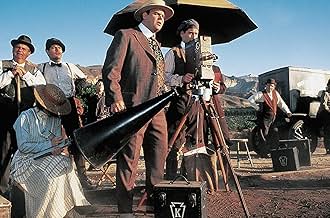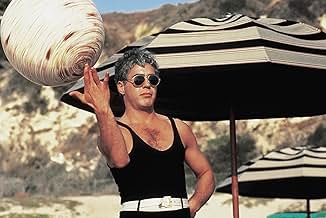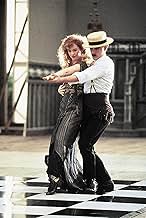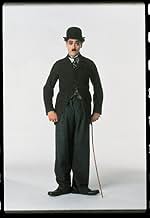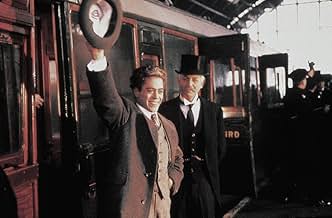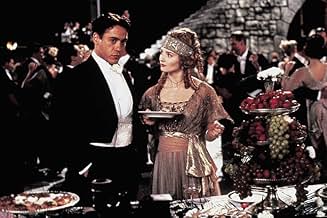CALIFICACIÓN DE IMDb
7.5/10
64 k
TU CALIFICACIÓN
Una película sobre la controvertida y difícil vida del máster de la comedia Charlie Chaplin.Una película sobre la controvertida y difícil vida del máster de la comedia Charlie Chaplin.Una película sobre la controvertida y difícil vida del máster de la comedia Charlie Chaplin.
- Dirección
- Guionistas
- Elenco
- Nominado a 3 premios Óscar
- 3 premios ganados y 20 nominaciones en total
Deborah Moore
- Lita Grey
- (as Deborah Maria Moore)
Opiniones destacadas
Robert Downey, Jr. gives another one of his splendid performances, Kevin Kline is perfectly cast as Fairbanks, and most of the direction is superb. However, the story hops around a few too many times, and the scenes with Anthony Hopkins are weak and obviously placed in order to clarify things to non- Chaplin fans who watch the film. Overall it is enjoyable, especially the parts when we see him creating his well- known masterpieces. Recommended especially for movie fans, and most especially for Chaplin fans.
Chaplin works on many levels, because on the one hand it packs an entertaining epic in to two hours and thirty minutes, but doesn't fail to keep up your interest and comes over as being very enjoyable. Perhaps the problem is that, Chaplins life might not be the most suitable for a MOVIE,purely because his life was so eventful, and might have translated itself better as a TV Mini Series, but for getting the best out of what screen time available and still coming up with some very credible work, you must hand it over to Richard Attenborough and everyone at Carolco. For starters, the movie is simply beautiful to look at. The production design by Stuart Craig [these days of Harry Potter fame] is well tuned with the simply fantastic Cinematography by Sven Nykvist, and this is why the movie works so well, because at the more tedious intermissions the movie has to offer [and there are only a few], the movie is still interesting and prestine to watch. Just as good are Ellen Mirojnick and John Mollo's costumes designs, in fact, Chaplin offers a production so rich that at once i forgot that this was a period film, and felt transported back to the various different time zones the movie had to offer, and this is a good sign of a genius at work. Richard Attenborough did similar wonders with his Ghandi [1982], in my opinion he does it far more interestingly here. The real revelation of the movie is Robert Downey JR as Chaplin. I remember reading in a book entitled The Chaplin Encyclopedia, that hearts sank when an American assumed the role. Well, i cant really understand the kinetics behind this seeing that Chaplin spent 85% of his life away from England and was more of a worldwide Icon than a British spearhead, plus the fact that Americans ARE Good Actors, and Downey JR is one of the very finest. Charlie Chaplin himself was a couple of years before my time, but Downey JR is so fantastic, so realistic in the role that i didn't for one minute doubt the genius of the REAL Chaplin and in fact only became a fan of the little tramp after seeing this Biopic, as though the missing pieces of Chaplins life had come together to complete the jigsaw. Downey JR carries the movie, it is hard to imagine anyone else in the role, he is the right build, height and of simmilar looks and even nails the accent down. He even does The Little Tramp so covincingly that i think that Chaplin himself would have been forced to admit how good he is. This could prove to be Downey JR's best work on screen, but i hope like many other of his admirers that things do go right for him,and he gets on the right track and he is good to himself in future. On a side note i definitely think that Robert was worthy of the Academy Award for best actor for this, but the BAFTA is more than Justified. Hopefully his role in the adaption of Denis Potter's The Singing Detective will be good enough for him to be recognised by the Academy. The only down side to the characterisation awarded to Robert Downey JR in the title role is that the other characters pale in significance. Admitedly it is nice to see the famous faces such as Kevin Kline as Douglas Fairbanks, Diane Lane, Penelope Anne Miller and the Late great John Thaw in a heart rendering cameo as Chaplins great influence Fred Karno. But their characters are so limited that the come a cross as essential but perhaps slightly surplus. More impressive and important are the likes of Dan Ackroyd in an hillarious cameo as Mack Sennet, and the interstingly cast Geraldine Chaplin as her own grandmother Hanna. The fact that Hannah Caplin was mentally ill and the effects it had on Charlie Chaplin are nicely hinted at but in large glossed over. Anthony Hopkins is, it must be said, wasted as the fictional George Hayden. It is however reassuring to see Hopkins, and he himself 15 or so years earlier might have made a good Chaplin himself. Paul Rhys, too is kept in the dark, wich is unfortunate because the character he plays, Chaplins brother sid, was quite a big cog in the Chaplin works [see Modern Times-joke]. The nicest other part is that of Hetty Kelly/Oona Chaplin, Chaplins first and last loves, played by Moira Kelly. Kelly's presence adds a nice touch of grace and gentleness to the movie. Perhaps the real failing of the movie is, like this review, it tries to pack to much in, and like i said this would have been better done as a TV Mini series, or even two movies. These minor quibbles asides, Chaplin boasts an enjoyably epic screenplay by Diana Hawkins, William Boyd, Bryan Forbes and the Legendary William Goldman, based on David Robinsons Chaplin-His Life and Art and My Autobiography by Chaplin Himself. The movie is tightly directed and edited, includes nice trick photography and is very professionaly and well acted, particularly y Robert Downey JR but everyone ivolved does well, no matter the merits of the characterisations. It also has one of the most beautiful, moving musical scores by John Barry, perhaps his best, sadly over looked of scores. If you havent seen the movie, i hope this review helps whet your appetite, because it is a very worthwhile worth seeing movie..........
Robert Downey Jr., first of all, portrays Chaplin with amazing accuracy. Some parts of this performance are particularly memorable, such as his invention of the famous tramp's walk just after having feverishly picked out the outfit, the astonishingly accurate depiction of Charlie as an old man, and of course, the many parts of the film that involve parts of his life where he was working on his own films. These are clearly some of the most interesting parts of the movie, if only because these films are how we know him, but it is at least as interesting the way that the film hints towards things that happened in Chaplin's life that inspired those films.
Very early in the film, we see a scene in which Charlie's mother is booed off the stage by an impatient crowd, so Charlie, who is a little boy at the time, gets on stage to do a song and dance of his own. He performs a song that is very similar to the one his mother performed, but he wins the audience's heart and they respond by tossing coins onto the stage for him. You can't help noticing how this corresponds with the constantly youthful look of the Tramp (in Modern Times, for example, Chaplin was in his late 40s but looked like a teenager), and the coins tossed on stage may have played a significant role in helping him realize that this could be a good way to make money.
Charlie moves to America to pursue his dream, and we see the landmark events that punctuated his dizzying rise to stardom. He goes to work briefly on stage and is then hired by Mack Sennett, a gigantic figure in film history, but is unsatisfied because of his own lack of control over his work. It should also be noted here that there is a scene where he is working with director Mabel Normand, who demands acting from him that he does not agree with, and with whom he clashes. In 1914, Chaplin starred in a 9 ½ minute film called Mabel's Busy Day, in which he plays the uncharacteristic role of the antagonist. The Mabel in this film is a sporting event vendor who turns down Charlie's amorous advances, after which Charlie proceeds to steal all of her products and hand them out to anyone standing nearby. Then in 1920, he starred in another short comedy called Mabel's Strange Predicament, in which Mabel is a woman who becomes locked out of her hotel room in her pajamas and ends up avoiding the drunken Charlie for the rest of the film. In both films, Charlie plays uncharacteristic roles, the most unenviable of which was in Mabel's Busy Day, which Mabel Norman directed.
Later in the film we see Charlie in a small diner just after having terminated his employment with Mack Sennett, and he meets Edna Purviance in a scene that is reminiscent of his romantic endeavors in such early films as Caught In A Cabaret and, even more so, The Immigrant, one of his most famous early films. There are dozens of other references to the development of his cinematic personality - such as his sudden realization of how to make the Tramp appear rich to the blind girl in City Lights without talking, as well as the dance of the dinner rolls, which Charlie performs here at a dinner at an expensive restaurant - but there is an even more significant portrayal of Charlie's beliefs and his values in this movie that are more recognizable as well as more memorable to people not familiar with his earlier and less known work.
Charlie Chaplin was one of many filmmakers' in the earlier times of the medium that resented and disapproved of the coming of sound to the movies. His Tramp remains one of the most recognized figures in the history of the cinema, and it is widely known that the Tramp is an almost entirely silent character, so it is necessary for a film about Chaplin's life to address this in some way, and it is done perfectly here. There is a scene where Charlie's brother is trying to convince him to add spoken dialogue into his films and Charlie refuses outright, giving a hilarious example of a Russian ballet dancer and saying, `The Tramp CAN'T talk. The minute he talks, he's dead.' This is a brilliant way to illustrate Charlie's fondness for the silent film, as well as his knowledge that no voice given to the Tramp would fit his character right. He was too well known to be changed so profoundly.
Charlie Chaplin created 81 movies in his lifetime, many of them timeless and truly memorable, and has made a significant impact on the filmmaking medium as well as on the world itself. He was a fascinating personality both onscreen and off, which is another element of his life that was necessarily and skillfully presented in this film, this time directly in the dialogue in what is probably the single most important line in the entire film `If you want to understand me, watch my movies.' Chaplin's ever-present sympathy for the underprivileged is subtly but effectively portrayed as two poor people approach him on his way out of a nice restaurant, right at the beginning of the Great Depression, asking for his autograph. The elderly Charlie notes in retrospect that, `I wish they'd wanted my money.'
He is always aware throughout the film and throughout his life of the difficulties constantly facing poor people, and he wants to give these people not only an escape with his films, but hope for the future. There is a point in the film where Charlie has returned to Europe to see an old friend, and he learns on the train that she has died. He is then asked, `What'll we do, Charlie?' And his answer, although spoken under his breath almost in a whisper, rings louder than anything else in the film.
`Smile.'
Very early in the film, we see a scene in which Charlie's mother is booed off the stage by an impatient crowd, so Charlie, who is a little boy at the time, gets on stage to do a song and dance of his own. He performs a song that is very similar to the one his mother performed, but he wins the audience's heart and they respond by tossing coins onto the stage for him. You can't help noticing how this corresponds with the constantly youthful look of the Tramp (in Modern Times, for example, Chaplin was in his late 40s but looked like a teenager), and the coins tossed on stage may have played a significant role in helping him realize that this could be a good way to make money.
Charlie moves to America to pursue his dream, and we see the landmark events that punctuated his dizzying rise to stardom. He goes to work briefly on stage and is then hired by Mack Sennett, a gigantic figure in film history, but is unsatisfied because of his own lack of control over his work. It should also be noted here that there is a scene where he is working with director Mabel Normand, who demands acting from him that he does not agree with, and with whom he clashes. In 1914, Chaplin starred in a 9 ½ minute film called Mabel's Busy Day, in which he plays the uncharacteristic role of the antagonist. The Mabel in this film is a sporting event vendor who turns down Charlie's amorous advances, after which Charlie proceeds to steal all of her products and hand them out to anyone standing nearby. Then in 1920, he starred in another short comedy called Mabel's Strange Predicament, in which Mabel is a woman who becomes locked out of her hotel room in her pajamas and ends up avoiding the drunken Charlie for the rest of the film. In both films, Charlie plays uncharacteristic roles, the most unenviable of which was in Mabel's Busy Day, which Mabel Norman directed.
Later in the film we see Charlie in a small diner just after having terminated his employment with Mack Sennett, and he meets Edna Purviance in a scene that is reminiscent of his romantic endeavors in such early films as Caught In A Cabaret and, even more so, The Immigrant, one of his most famous early films. There are dozens of other references to the development of his cinematic personality - such as his sudden realization of how to make the Tramp appear rich to the blind girl in City Lights without talking, as well as the dance of the dinner rolls, which Charlie performs here at a dinner at an expensive restaurant - but there is an even more significant portrayal of Charlie's beliefs and his values in this movie that are more recognizable as well as more memorable to people not familiar with his earlier and less known work.
Charlie Chaplin was one of many filmmakers' in the earlier times of the medium that resented and disapproved of the coming of sound to the movies. His Tramp remains one of the most recognized figures in the history of the cinema, and it is widely known that the Tramp is an almost entirely silent character, so it is necessary for a film about Chaplin's life to address this in some way, and it is done perfectly here. There is a scene where Charlie's brother is trying to convince him to add spoken dialogue into his films and Charlie refuses outright, giving a hilarious example of a Russian ballet dancer and saying, `The Tramp CAN'T talk. The minute he talks, he's dead.' This is a brilliant way to illustrate Charlie's fondness for the silent film, as well as his knowledge that no voice given to the Tramp would fit his character right. He was too well known to be changed so profoundly.
Charlie Chaplin created 81 movies in his lifetime, many of them timeless and truly memorable, and has made a significant impact on the filmmaking medium as well as on the world itself. He was a fascinating personality both onscreen and off, which is another element of his life that was necessarily and skillfully presented in this film, this time directly in the dialogue in what is probably the single most important line in the entire film `If you want to understand me, watch my movies.' Chaplin's ever-present sympathy for the underprivileged is subtly but effectively portrayed as two poor people approach him on his way out of a nice restaurant, right at the beginning of the Great Depression, asking for his autograph. The elderly Charlie notes in retrospect that, `I wish they'd wanted my money.'
He is always aware throughout the film and throughout his life of the difficulties constantly facing poor people, and he wants to give these people not only an escape with his films, but hope for the future. There is a point in the film where Charlie has returned to Europe to see an old friend, and he learns on the train that she has died. He is then asked, `What'll we do, Charlie?' And his answer, although spoken under his breath almost in a whisper, rings louder than anything else in the film.
`Smile.'
An attempt to make a film that is both honest and at the same time shamelessly self-serving about its (auto)biographical subject -- the legendary comedian/director Chaplin -- is pulled off with style. It's fun to see some modern talents inhabit the roles of screen's bygone icons (though in some cases a little less charicature would have been appreciated, especially in the case of Mabel Normand). Kline, surprisingly enough, makes a convincing Fairbanks. The rest of the cast is also well-picked -- X-Files fans should watch closely to catch quite a few glimpses of lower-billed David Duchovny as Chaplin's personal editor.
The direction is very good; I particularly liked how some of the straight scenes were filmed in a comic, surrealist style (Chaplin's escape from the police w/ his cans of "the Kid" reels is staged like a Keystone Komedy), while some of what might have been more comic elements are played straight (Chaplin's attempt to convince his brother that "The Tramp" cannot talk in a movie is both funny and serious, for example). Some of the (perhaps true to life) melodramatic elements are a bit overplayed (the bit with his mom was handled too heavily for my tastes, especially her shouting his name as she's dragged away by the asylum guards), but generally the film avoids genre cliches and "easy" scenes.
Great photography.
Downey Jr. fits the roll well, even rising to many of the physical challenges of the Chaplin mystique.
A superior film of its type, laced with self-conscious humor and self-reflection on the artistic temperament.
The direction is very good; I particularly liked how some of the straight scenes were filmed in a comic, surrealist style (Chaplin's escape from the police w/ his cans of "the Kid" reels is staged like a Keystone Komedy), while some of what might have been more comic elements are played straight (Chaplin's attempt to convince his brother that "The Tramp" cannot talk in a movie is both funny and serious, for example). Some of the (perhaps true to life) melodramatic elements are a bit overplayed (the bit with his mom was handled too heavily for my tastes, especially her shouting his name as she's dragged away by the asylum guards), but generally the film avoids genre cliches and "easy" scenes.
Great photography.
Downey Jr. fits the roll well, even rising to many of the physical challenges of the Chaplin mystique.
A superior film of its type, laced with self-conscious humor and self-reflection on the artistic temperament.
The first thing one should know about "Chaplin" is that, paradoxically, very little of it has to do with Chaplin. Or, at least, it has more to do with the writers' illusions of him. The film claims to be based on "My Autobiography" and on "Chaplin: His Life and Art", by David Robinson. Having re-read the Autobiography before watching the film, it is clear to me that what the writers did was take basic incidents from the autobiography and embellish them with, I can only assume, parts of the Robinson book. What results is a series of scenes which were vaguely influenced by the facts, but so simplified and primitive that little of the original truth remains.
What the writers did not wish to acknowledge was that when Chaplin wrote vaguely or skimmed past certain parts of his life, he really didn't want anyone to delve into them - and the filmmakers did just that. "Chaplin" is not really about Charlie Chaplin, his work and films. It is simply ceaseless speculation on his personal life, but going on even more vaguely about it than the Autobiography.
I am well aware that almost every biopic focuses more on the personal life of a person than on their work. The problem is that most of the characters in "Chaplin" are so exaggerated and simplified that they become almost completely unbelievable - both as the real people AND as fictional characters. None of them are fully developed. This is not entirely the fault of the supporting cast (although it really is not that interesting): the fault lies with the screenplay, which is too often bland and melodramatic. This is especially obvious in the ridiculous subplot concerning the older Chaplin and his editor, which is the most pointless and badly done part of the film; even Hopkins cannot make the lines sound credible, which is all the proof anyone needs of their mediocrity. The film would have worked immeasurably better without these additions.
Many of the most interesting aspects and parts of Chaplin's life are completely ignored, oddly, with seemingly irrelevant or less important stories added in for little reason. One scene in particular is added only to insert a Chaplin-esquire physical comedy sequence which falls flat. The writers greatly accentuated everything to do with Hetty Kelly, even making the same actress play Oona O'Neill; the tried too hard to give him some kind of motive for his relationships, which only leads to more bias and speculation; and although I am by no means a Chaplin purist or even a very knowledgeable admirer, the blatant alterations on the actual history grated on my nerves.
All this being said, the film is certainly not a terrible one. Mainly, however, this is for one reason only, and that is - yes - Robert Downey Jr. himself. The praise he received for the role is by no means undeserved. As Chaplin he is perfect, managing to make the best out of his rather predictable lines, remaining interesting, believable, and in many parts moving. He has wonderful timing and intensity, and even looks the part (he could even do the roll dance). I really quite believed he was Chaplin. Even his performance, however, suffers greatly because of the lines - and the flash-forwards. I have no doubt that he could have played an even better Charlie Chaplin in a differently made film.
The greatest scene in "Chaplin", I think, is the opening credits: Charlie arrives in his dressing room, alone, sits, and begins to remove his make-up. The scene is in black and white, and there is no dialogue - only music. Every emotion is expressed simply through his eyes. If the rest of the film had been made like this, I actually think it could have been perfect. Either way, the lead performance is astounding, the music is beautiful, and though not very insightful or too true to history, this film is well worth watching.
What the writers did not wish to acknowledge was that when Chaplin wrote vaguely or skimmed past certain parts of his life, he really didn't want anyone to delve into them - and the filmmakers did just that. "Chaplin" is not really about Charlie Chaplin, his work and films. It is simply ceaseless speculation on his personal life, but going on even more vaguely about it than the Autobiography.
I am well aware that almost every biopic focuses more on the personal life of a person than on their work. The problem is that most of the characters in "Chaplin" are so exaggerated and simplified that they become almost completely unbelievable - both as the real people AND as fictional characters. None of them are fully developed. This is not entirely the fault of the supporting cast (although it really is not that interesting): the fault lies with the screenplay, which is too often bland and melodramatic. This is especially obvious in the ridiculous subplot concerning the older Chaplin and his editor, which is the most pointless and badly done part of the film; even Hopkins cannot make the lines sound credible, which is all the proof anyone needs of their mediocrity. The film would have worked immeasurably better without these additions.
Many of the most interesting aspects and parts of Chaplin's life are completely ignored, oddly, with seemingly irrelevant or less important stories added in for little reason. One scene in particular is added only to insert a Chaplin-esquire physical comedy sequence which falls flat. The writers greatly accentuated everything to do with Hetty Kelly, even making the same actress play Oona O'Neill; the tried too hard to give him some kind of motive for his relationships, which only leads to more bias and speculation; and although I am by no means a Chaplin purist or even a very knowledgeable admirer, the blatant alterations on the actual history grated on my nerves.
All this being said, the film is certainly not a terrible one. Mainly, however, this is for one reason only, and that is - yes - Robert Downey Jr. himself. The praise he received for the role is by no means undeserved. As Chaplin he is perfect, managing to make the best out of his rather predictable lines, remaining interesting, believable, and in many parts moving. He has wonderful timing and intensity, and even looks the part (he could even do the roll dance). I really quite believed he was Chaplin. Even his performance, however, suffers greatly because of the lines - and the flash-forwards. I have no doubt that he could have played an even better Charlie Chaplin in a differently made film.
The greatest scene in "Chaplin", I think, is the opening credits: Charlie arrives in his dressing room, alone, sits, and begins to remove his make-up. The scene is in black and white, and there is no dialogue - only music. Every emotion is expressed simply through his eyes. If the rest of the film had been made like this, I actually think it could have been perfect. Either way, the lead performance is astounding, the music is beautiful, and though not very insightful or too true to history, this film is well worth watching.
¿Sabías que…?
- TriviaGeraldine Chaplin played her real-life paternal grandmother Hannah Chaplin.
- ErroresWhen Charlie is shown at the 1972 Oscars near the end of the movie, he is showed being brought to the podium in the wheelchair and then standing at the podium as the movie clips played. In the actual awards ceremony, Charlie walked out to the podium under his own power after the clips ended.
- Citas
German Diplomat: [offering his hand] Mr. Chaplin! I am a great admirer of yours.
Charlie Chaplin: I'm sorry, I prefer not to shake hands with Nazis.
German Diplomat: [laughs nervously] What have you got against us, Mr. Chaplin, hm?
Charlie Chaplin: What have you got against everybody else?
- Créditos curiososThe film ends with the final scene of El circo (1928): Charlie Chaplin walks off into the distance.
- Versiones alternativasTo receive a 12 certificate the original UK cinema version was cut to remove one use of 'fucking' (during Charlie's homecoming visit to a pub). Later releases were uncut and upgraded to a 15 rating.
- ConexionesFeatured in Friday Night: Episode #1.11 (1992)
- Bandas sonorasThe Honeysuckle and The Bee
Written by Albert Fitz and William H. Penn (as William Penn)
Selecciones populares
Inicia sesión para calificar y agrega a la lista de videos para obtener recomendaciones personalizadas
- How long is Chaplin?Con tecnología de Alexa
Detalles
- Fecha de lanzamiento
- Países de origen
- Sitios oficiales
- Idiomas
- También se conoce como
- Charlie
- Locaciones de filmación
- Productoras
- Ver más créditos de la compañía en IMDbPro
Taquilla
- Presupuesto
- USD 31,000,000 (estimado)
- Total en EE. UU. y Canadá
- USD 9,493,259
- Fin de semana de estreno en EE. UU. y Canadá
- USD 84,669
- 27 dic 1992
- Total a nivel mundial
- USD 9,493,259
- Tiempo de ejecución2 horas 23 minutos
- Color
- Relación de aspecto
- 1.85 : 1
Contribuir a esta página
Sugiere una edición o agrega el contenido que falta




